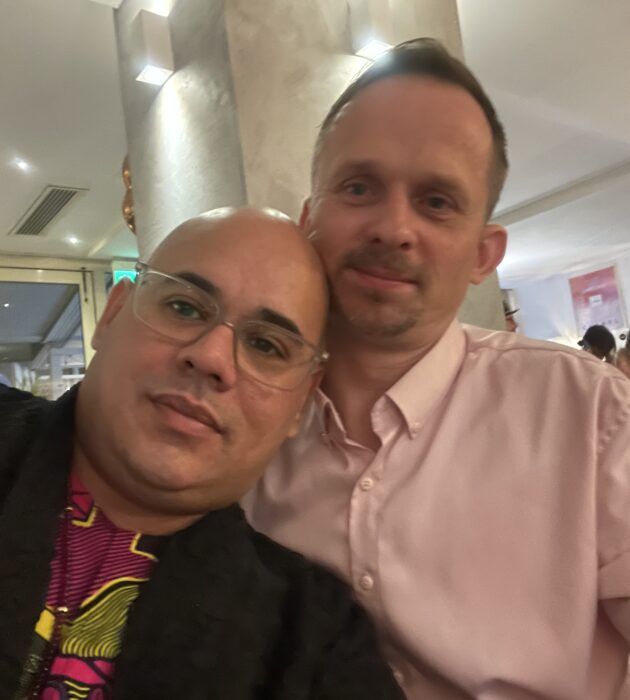
The Unseen Heroes: The Role of Unpaid Carers
Alvyi Samuels
- Lived experience
- Person-centred care
- Communication and administration
Introduction
My name is Alv. I came to the United Kingdom over 15 years ago, and met my husband 10 years ago. Before I met them, I didn’t know anything about health and social care. I came to the UK because the place I’m from is not very inclusive of the rights of LGBT+ people. My husband and I are married in a same-sex marriage, which has added complexities to my role as an unpaid carer. My natural support network, such as my family, isn’t there because of stigma. We’ve had to create our own family and extended networks.
The role of unpaid carers
Being an unpaid carer is a role that often goes unrecognised and undervalued, yet it is one of the most vital pillars of support in our society. As the spouse of someone working at a strategic level nationally on co-production, I have first-hand experience of the challenges and rewards that come with being an unpaid carer.
One of the major issues I’ve faced as an unpaid carer is not knowing where to go for information, advice, and guidance. Often, I find myself shut out of conversations that are essential to the care of my loved one. This is due to a myriad of reasons, including complex language, assumptions about our relationship and its recognition, and decisions being made without even consulting me, despite their impact on my caregiving role.
Caring is particularly challenging when I am faced with these barriers. This has meant taking time off work, experiencing my own challenges around mental health and wellbeing, feeling overwhelmed and burnt out, and often not having the space to even take a break. This is very hard to talk about because you never want the person you’re supporting to know this. But more can be done to prevent these things from happening. For instance, when my husband goes into the hospital, no one informs me about the plan or process. If we are going into a crisis point, when I reach out, I am often faced with the response that I can handle it – with this assumption being made without even asking me.
Navigating the journey alone
My husband’s expertise in health and social care has provided them with a network of support, but I often find myself navigating this journey alone, without the recognition or support I need. Despite the lack of acknowledgment, I am deeply passionate about supporting my husband in a way that aligns with their needs and preferences.
The changing dynamics of relationships
Becoming an unpaid carer inevitably changes the dynamic of a relationship. Taking on the additional role of caregiver is one that demands time, effort, and emotional energy. While the opportunity to care for someone you love is incredibly rewarding, it also presents its own set of challenges.
The need for support and recognition
One of the greatest challenges faced by unpaid carers is the lack of information, advice, and guidance available to them. Often, we are left to navigate complex systems and procedures without adequate support. Our needs are frequently overlooked, leaving us feeling isolated and overwhelmed.
Despite these challenges, unpaid carers play a crucial role in supporting individuals to live their best lives. Not only do we contribute invaluable time and effort to ensure the wellbeing of our loved ones, but we also make significant contributions to the economy through our unpaid labour.
The importance of co-production
One of the things that could make a huge difference is ensuring that family members and unpaid carers are seen as essential to every conversation regarding care. For me as a carer, co-production is the only way to achieve this.
Co-production means working in a way that hears everybody’s voice. Everyone has the opportunity to collaborate, and together, we come up with mutually beneficial solutions. Co-production is something I had never heard of before, but when it is done well, it makes all the difference.
Co-production is not just a method; it is the only means to truly ensure that everyone has an equitable voice. By bringing individuals together, co-production fosters power sharing and promotes a collective approach to problem-solving. It encourages us to see issues from each person’s unique perspective, creating solutions that are inclusive and representative of all voices.
It not only supports the individual needing care but also supports the unpaid carer. By involving carers in the decision-making process, we ensure that their insights and needs are considered, leading to more effective and compassionate care.
A Call for Change
While I wouldn’t trade this role for anything in the world, it’s essential that we recognise the needs of unpaid carers and prioritise their well-being. After all, if we are not cared for, how can we continue to care for those we love?
Unpaid carers are the unsung heroes of our society. It’s time we acknowledge their contributions, provide them with the support they deserve, and ensure that their needs are prioritised. Only then can we truly honour the invaluable role they play in our lives.